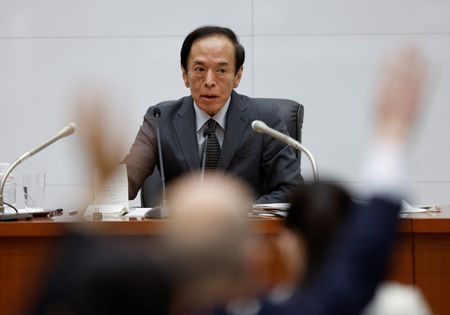 1
1 1
1
By Leika Kihara
TOKYO (Reuters) -Bank of Japan (BOJ) Governor Kazuo Ueda said on Tuesday the central bank will end its yield curve control policy and then start shrinking its balance sheet, once prospects heighten for inflation to sustainably hit its 2% target.
Speaking in parliament, Ueda said Japan’s economy was picking up and inflation expectations remain at high levels.
“We’re seeing some positive signs in trend inflation, including inflation expectations,” the BOJ chief said.
“When we can foresee inflation sustainably and stably meeting our 2% target, we will abandon yield curve control and then move towards shrinking the bank’s balance sheet.”
Ueda, however, warned of various uncertainties on the outlook such as whether recent strong wage growth will be sustained, and spread to smaller firms.
Under yield curve control (YCC), the BOJ sets a short-term interest rate target of -0.1% and caps the 10-year bond yield around zero as part of efforts to durably hit its price goal.
With inflation exceeding the BOJ’s target, markets are rife with speculation that Ueda will soon phase out YCC, which has drawn public criticism for distorting market pricing and crushing bank profits.
Ueda has repeatedly ruled out an immediate interest rate hike on the view the recent rise in inflation was driven mostly by rising import costs, rather than strong domestic demand.
But at the first meeting since Ueda became governor last month, the BOJ removed a policy guidance pledging to keep interest rates at “current or lower levels.”
It also announced a plan to review its past monetary policy moves, laying the groundwork to gradually phase out his predecessor’s massive stimulus programme.
Ueda said the review will scrutinise the benefits and side effects of past monetary policy, including by conducting workshops with private academics.
He also said the central bank did not have any pre-set idea on how the review could affect its future monetary policy decisions.
“We will take necessary policy steps at each of our rate reviews, with an eye on financial and price developments, even while we conduct the review,” Ueda said.
Japan’s core consumer inflation hit 3.1% in March, well above the central bank’s target, and an index excluding fuel costs rose at the fastest annual pace in four decades in a sign of broadening price pressure.
(Reporting by Leika Kihara; Editing by Himani Sarkar, Shri Navaratnam and Lincoln Feast)